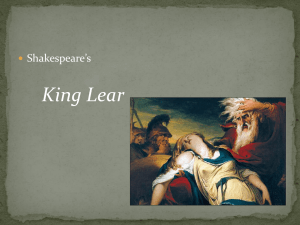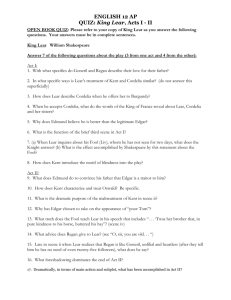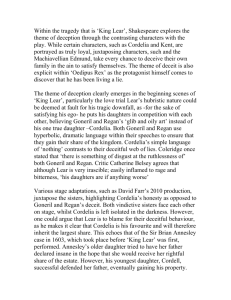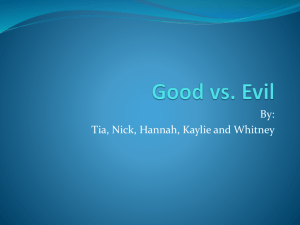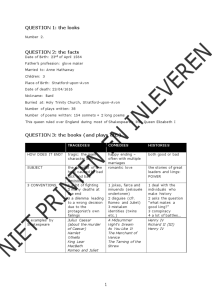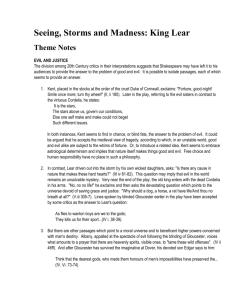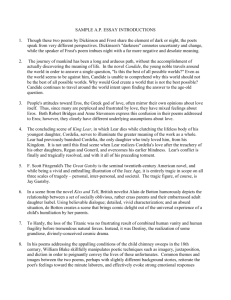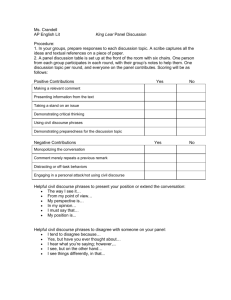Practice final test
advertisement
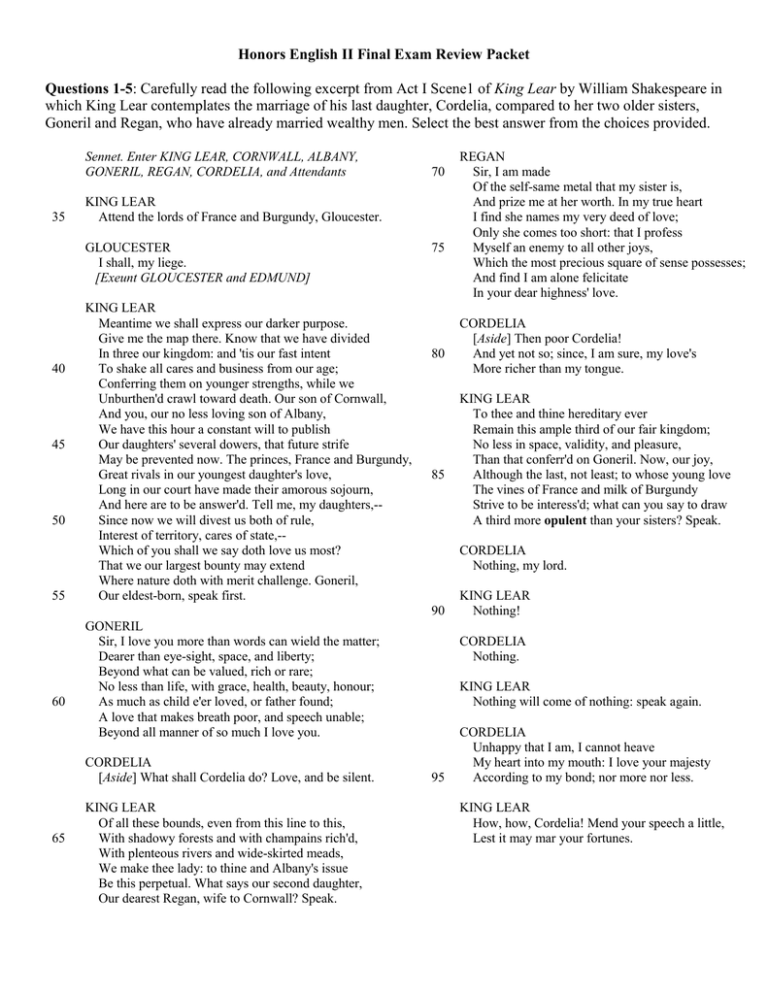
Honors English II Final Exam Review Packet Questions 1-5: Carefully read the following excerpt from Act I Scene1 of King Lear by William Shakespeare in which King Lear contemplates the marriage of his last daughter, Cordelia, compared to her two older sisters, Goneril and Regan, who have already married wealthy men. Select the best answer from the choices provided. Sennet. Enter KING LEAR, CORNWALL, ALBANY, GONERIL, REGAN, CORDELIA, and Attendants 35 KING LEAR Attend the lords of France and Burgundy, Gloucester. GLOUCESTER I shall, my liege. [Exeunt GLOUCESTER and EDMUND] 40 45 50 55 70 KING LEAR Meantime we shall express our darker purpose. Give me the map there. Know that we have divided In three our kingdom: and 'tis our fast intent To shake all cares and business from our age; Conferring them on younger strengths, while we Unburthen'd crawl toward death. Our son of Cornwall, And you, our no less loving son of Albany, We have this hour a constant will to publish Our daughters' several dowers, that future strife May be prevented now. The princes, France and Burgundy, Great rivals in our youngest daughter's love, Long in our court have made their amorous sojourn, And here are to be answer'd. Tell me, my daughters,-Since now we will divest us both of rule, Interest of territory, cares of state,-Which of you shall we say doth love us most? That we our largest bounty may extend Where nature doth with merit challenge. Goneril, Our eldest-born, speak first. 75 80 85 GONERIL Sir, I love you more than words can wield the matter; Dearer than eye-sight, space, and liberty; Beyond what can be valued, rich or rare; No less than life, with grace, health, beauty, honour; As much as child e'er loved, or father found; A love that makes breath poor, and speech unable; Beyond all manner of so much I love you. CORDELIA [Aside] What shall Cordelia do? Love, and be silent. 65 KING LEAR Of all these bounds, even from this line to this, With shadowy forests and with champains rich'd, With plenteous rivers and wide-skirted meads, We make thee lady: to thine and Albany's issue Be this perpetual. What says our second daughter, Our dearest Regan, wife to Cornwall? Speak. CORDELIA [Aside] Then poor Cordelia! And yet not so; since, I am sure, my love's More richer than my tongue. KING LEAR To thee and thine hereditary ever Remain this ample third of our fair kingdom; No less in space, validity, and pleasure, Than that conferr'd on Goneril. Now, our joy, Although the last, not least; to whose young love The vines of France and milk of Burgundy Strive to be interess'd; what can you say to draw A third more opulent than your sisters? Speak. CORDELIA Nothing, my lord. 90 60 REGAN Sir, I am made Of the self-same metal that my sister is, And prize me at her worth. In my true heart I find she names my very deed of love; Only she comes too short: that I profess Myself an enemy to all other joys, Which the most precious square of sense possesses; And find I am alone felicitate In your dear highness' love. KING LEAR Nothing! CORDELIA Nothing. KING LEAR Nothing will come of nothing: speak again. 95 CORDELIA Unhappy that I am, I cannot heave My heart into my mouth: I love your majesty According to my bond; nor more nor less. KING LEAR How, how, Cordelia! Mend your speech a little, Lest it may mar your fortunes. 100 105 CORDELIA Good my lord, You have begot me, bred me, loved me: I Return those duties back as are right fit, Obey you, love you, and most honour you. Why have my sisters husbands, if they say They love you all? Haply, when I shall wed, That lord whose hand must take my plight shall carry Half my love with him, half my care and duty: Sure, I shall never marry like my sisters, To love my father all. KING LEAR But goes thy heart with this? 110 CORDELIA Ay, good my lord. KING LEAR So young, and so untender? CORDELIA So young, my lord, and true. 115 120 125 KING LEAR Let it be so; thy truth, then, be thy dower: For, by the sacred radiance of the sun, The mysteries of Hecate, and the night; By all the operation of the orbs From whom we do exist, and cease to be; Here I disclaim all my paternal care, Propinquity and property of blood, And as a stranger to my heart and me Hold thee, from this, for ever. The barbarous Scythian, Or he that makes his generation messes To gorge his appetite, shall to my bosom Be as well neighbour'd, pitied, and relieved, As thou my sometime daughter. 1. In line 56-62, Goneril expresses her love for her father with the use of (QS 1) a. b. c. d. e. allusion anaphora hyperbole metonymy polysyndeton 2. Regan’s words in lines 70-78 are I. II. III. a. II only patronizing hyperbolic fawning b. c. d. e. I and II only I and III only II and III only I, II, and III 3. Cordelia’s tone in lines 79-81 could best be described as (QS 18, 19) a. b. c. d. e. resentful because her sisters’ love her father more than she loves him. indignant, because she realizes her love is stronger th an her sisters’ flattery. realistic, because she realizes she is worse off than her sisters. obsequious, because she believes she can outwit her sisters dishonest, because she sees herself as much better than her sisters. 4. In line 100, Cordelia reinforces her primary point by employing a(n) (QS 1) a. b. c. d. e. asyndeton polysyndeton rhetorical question simile verbal irony 5. From lines 116-125, the reader can infer that (QS 2, 13) a. b. c. d. e. King Lear is furious with his daughter’s choice not to marry one of the suitors he has chosen. King Lear will give her the biggest portion of land and the highest ranking suitor. Cordelia made the best choice for the kingdom in not flattering her father as her sisters did. King Lear wishes his other daughters were like Cordelia. Cordelia has displeased her father with her honesty and he has disowned her. Directions: Read the following passage. Then answer questions 7-10 on the basis of what is stated or implied in the passage and in the introductory statement. (5) (10) Readers of American history know that in 1927, Charles A. Lindbergh made the first solo flight across the Atlantic Ocean in a plane called the Spirit of St. Louis. But how many people know that in 1938, Douglas Corrigan achieved what might be called the first transatlantic hoax? instructor who longed to fly across the Atlantic. To assuage this itch, he prepared his 1929 Curtis-Robin monoplane for the journey; but because of its age and poor condition, federal aviation authorities refused to certify the plane for a transoceanic flight. At 31, Corrigan, a native Texan, was an airplane mechanic and flight Even so, Corrigan flew his patched-up plane from California to (20) (25) (30) (35) (40) (45) (50) (55) (60) New York in the summer of 1938. He then elicited permission from the aviation authorities to fly back home to California. Like Lindbergh, Corrigan took off from Long Island. Since his flight plan showed a return trip to California, his departure precipitated no suspicion. As he took off, he must have seemed the very epitome of an innocent amateur, for the flight staff at the Long Island airfield noted that the he headed eastward into clouds instead of turning west. This seemed a circuitous way to begin a trip to Los Angles! Twenty-eight hours and thirteen minutes later, an odd-looking plane landed at an airfield in Dublin, Ireland. “I’m Douglas Corrigan,” said the pilot. “Just got in from New York. Where am I?” (The outrage of the American officials, when they heard, can be imagined; but Corrigan continued to play the part of a cheerful, well-meaning amateur.) He ascribed his “mistake” in direction to a remarkably faulty compass and said that the clouds below him had kept him from seeing that he was flying over an ocean rather than the continental United States. Within hours of his landing, the story of “Wrong Way” Corrigan circled the world. Though his flight license was suspended for a short time, he was given a ticker-tape parade upon his return to New York. During a time of economic depression, Corrigan, who thwarted authority with a grin and a wink, captured American’s hearts. He stuck by his story-that he had gotten lost on his way to California-for the rest of his life 6. The meaning of assuage (line 12) is (QS 24) a. b. c. d. e. pay for Begin increase allay aggravate 7. Elicited (line 21) most nearly means (QS 24) a. b. c. d. e. extracted ignored pleaded for inferred falsified 8. The authorities denied Corrigan permission to make a transoceanic flight because (QS 13) a. He filed his application too late b. His plane was old and in poor condition c. The poor weather made flying dangerous d. His actions seemed suspicious e. He could not pay the required fees 9. The passage implies that none of the following feelings inspired the nickname “Wrong Way” EXCEPT (QS 21) a. b. c. d. e. obvious envy extreme greed public outrage affectionate disapproval sincere disillusionment 10. The author’s attitude toward Corrigan is best described as one of (QS 12) a. b. c. d. e. embarrassment admiration annoyance indifference hostility Read the excerpt below from President Roosevelt’s speech, “Four Freedoms”. Then, answer question 11 “The happiness of future generations of Americans may well depend upon how effective and how immediate we can make our aid felt. The Nation's hands must not be tied when the Nation's life is in danger. […] In the future days, which we seek to make secure, we look forward to a world founded upon four essential human freedoms. The first is freedom of speech and expression--everywhere in the world. The second is freedom of every person to worship God in his own way--everywhere in the world. The third is freedom from want--which, translated into world terms, means economic understandings which will secure to every nation a healthy peacetime life for its inhabitants-everywhere in the world. The fourth is freedom from fear--which, translated into world terms, means a world-wide reduction of armaments to such a point and in such a thorough fashion that no nation will be in a position to commit an act of physical aggression against any neighbor--anywhere in the world. That is no vision of a distant millennium. It is a definite basis for a kind of world attainable in our own time and generation.” 11. The president structures his argument by: (QS 6) (A) Asking a rhetorical question and then presenting the answer. (B) Proposing a general vision for the future and then giving specific examples to back it up. (C) Presenting his opponent’s views and then disproving them. (D) Stating the definition of a word and then providing alternate definitions for that word. Read the excerpt below from Martin Luther King, Jr.’s “I’ve Been to the Mountaintop” . Then, answer the question that follows: “… the world is all messed up. The nation is sick. Trouble is in the land; confusion all around. That's a strange statement. But I know, somehow, that only when it is dark enough can you see the stars. And I see God working in this period of the twentieth century in a way that men, in some strange way, are responding. Something is happening in our world. The masses of people are rising up. And wherever they are assembled today, whether they are in Johannesburg, South Africa; Nairobi, Kenya; Accra, Ghana; New York City; Atlanta, Georgia; Jackson, Mississippi; or Memphis, Tennessee -- the cry is always the same: ‘We want to be free.’” 12. Based on the speaker’s word choice and descriptions, his tone can best be described as: (QS 3, 18) (A) Disgusted (B) Apathetic (C) Hopeful (D) Embarrassed Read the excerpt below from Thomas Paine’s “The Crisis”. Then, answer the questions that follow: “'Tis surprising to see how rapidly a panic will sometimes run through a country. All nations and ages have been subject to them. Britain has trembled at the report of a French fleet of flat-bottomed boats; and in the fourteenth century the whole English army, after ravaging the kingdom of France, was driven back like men petrified with fear; and this brave exploit was performed by a few broken forces collected and headed by a woman, Joan of Arc. Yet panics, in some cases, have their uses; they produce as much good as hurt. Their duration is always short; the mind soon grows through them, and acquires a firmer habit than before. But their peculiar advantage is, that they are the touchstones of sincerity and hypocrisy, and bring things and men to light, which might otherwise have lain forever undiscovered.” 13. In the first paragraph, the examples of Joan of Arc and the French fleet serve to: (QS 23) (A) Back up the claim that people in all times and places can panic over something small. (B) Show how long the conflict between Britain and France has lasted. (C) Disprove the idea that panics have greatly affected history. (D) Force readers to question the claim that panic can spread quickly. 14. The second paragraph is different from the first because: (A) It depicts France and England as strong countries rather than weak ones. (B) It gives examples of how panic can be beneficial rather than showing the dangers of panic. (C) It gives specific examples of panic rather than simply defining the word. (D) It explains the psychological reasons for panic instead of the social causes of panic. Read the excerpt below from President Lincoln’s Second Inaugural Address, and answer the question that follows: “At this second appearing to take the oath of the presidential office, there is less occasion for an extended address than there was at the first. Then a statement, somewhat in detail, of a course to be pursued, seemed fitting and proper. Now, at the expiration of four years, during which public declarations have been constantly called forth on every point and phase of the great contest which still absorbs the attention, and engrosses the energies of the nation, little that is new could be presented. The progress of our arms, upon which all else chiefly depends, is as well known to the public as to myself; and it is, I trust, reasonably satisfactory and encouraging to all. With high hope for the future, no prediction in regard to it is ventured. On the occasion corresponding to this four years ago, all thoughts were anxiously directed to an impending civil war. All dreaded it--all sought to avert it. While the inaugural address was being delivered from this place, devoted altogether to saving the Union without war, insurgent agents were in the city seeking to destroy it without war - seeking to dissolve the Union, and divide effects, by negotiation. Both parties deprecated war; but one of them would make war rather than let the nation survive; and the other would accept war rather than let it perish. And the war came.” 15. Which of the following claims in Lincoln’s speech could not be supported by historical evidence? (QS 28) The following is an extract from a statement made by President Roosevelt, announcing that the 18th amendment, the law prohibiting the drinking or selling alcohol, has officially been overturned. “I, Franklin D. Roosevelt, President of the United States of America pursuant to the provisions of Section 217 (a) of the said Act of June 16, 1933, do hereby proclaim that the Eighteenth Amendment to the Constitution of the United States was repealed on the fifth day of December, 1933. Observance of this request, which I make personally to every individual and every family in our Nation, will result in the consumption of alcoholic beverages which have passed Federal inspection, in the break-up and eventual destruction of the notoriously evil illicit liquor traffic. I ask the wholehearted cooperation of all our citizens to the end that this return of individual freedom shall not be accompanied by the [disgusting] conditions that obtained prior to the adoption of the 18th Amendment and those that have existed since its adoption. Failure to do this honestly and courageously will be a living reproach to us all. […] We must remove forever from our midst the menace of the bootlegger and such others as would profit at the expense of good government, law and order. I trust in the good sense of the American people that they will not bring upon themselves the curse of excessive use of intoxicating liquors, to the detriment of health, morals and social integrity.” 16. Which of the President’s claims could be challenged as logically false? (QS 28) (A) The Eighteenth Amendment was repealed on the fifth day of December, 1933. (B) The excessive consumption of alcohol is detrimental to the health of Americans. (C) If people obey the new law, it will result in the destruction of illegal alcohol trafficking. Americans. (D) The law means a return to individual freedom for Martin Luther King, Jr.’s “I Have a Dream” (1963) speech. Then answer the questions that follow: 17. Why do you think King says “Five score years ago” instead of saying “A hundred years ago” in the first line of his second paragraph? (QS 6) (A) Because “five score” is not equal to “a hundred.” (B) That was the way everyone spoke in the 1960s. (C) He was religious, and that was the way people spoke in the Bible. (D) He wanted to remind his audience of Lincoln’s famous “Gettysburg Address,” which begins with the words: “Fourscore and seven years ago.” Hope, Despair and Memory A Hasidic legend tells us that the great Rabbi Baal-Shem-Tov, Master of the Good Name, also known as the Besht, undertook an urgent and perilous mission: to hasten the coming of the Messiah. The Jewish people, all humanity were suffering too much, beset by too many evils. They had to be saved, and swiftly. For having tried to meddle with history, the Besht was punished; banished along with his faithful servant to a distant island. In despair, the servant implored his master to exercise his mysterious powers in order to bring them both home. "Impossible", the Besht replied. "My powers have been taken from me". "Then, please, say a prayer, recite a litany, work a miracle". "Impossible", the Master replied, "I have forgotten everything". They both fell to weeping. Suddenly the Master turned to his servant and asked: "Remind me of a prayer - any prayer ." "If only I could", said the servant. "I too have forgotten everything". "Everything - absolutely everything?" "Yes, except - "Except what?" "Except the alphabet". At that the Besht cried out joyfully: "Then what are you waiting for? Begin reciting the alphabet and I shall repeat after you...". And together the two exiled men began to recite, at first in whispers, then more loudly: "Aleph, beth, gimel, daleth...". And over again, each time more vigorously, more fervently; until, ultimately, the Besht regained his powers, having regained his memory. 18. This is the opening of Weisel’s speech. What purpose does this opening have? (QS 23) from Emily Bronte’s Wuthering Heights: 1801. - I have just returned from a visit to my landlord - the solitary neighbour that I shall be troubled with. This is certainly a beautiful country! In all England, I do not believe that I could have fixed on a situation so completely removed from the stir of society. A perfect misanthropist's heaven: and Mr. Heathcliff and I are such a suitable pair to divide the desolation between us. A capital fellow! He little imagined how my heart warmed towards him when I beheld his black eyes withdraw so suspiciously under their brows, as I rode up, and when his fingers sheltered themselves, with a jealous resolution, still further in his waistcoat, as I announced my name. 'Mr. Heathcliff?' I said. A nod was the answer. 'Mr. Lockwood, your new tenant, sir. I do myself the honour of calling as soon as possible after my arrival, to express the hope that I have not inconvenienced you by my perseverance in soliciting the occupation of Thrushcross Grange: I heard yesterday you had had some thoughts - ' 'Thrushcross Grange is my own, sir,' he interrupted, wincing. 'I should not allow any one to inconvenience me, if I could hinder it - walk in!' The 'walk in' was uttered with closed teeth, and expressed the sentiment, 'Go to the Deuce:' even the gate over which he leant manifested no sympathising movement to the words; and I think that circumstance determined me to accept the invitation: I felt interested in a man who seemed more exaggeratedly reserved than myself. When he saw my horse's breast fairly pushing the barrier, he did put out his hand to unchain it, and then sullenly preceded me up the causeway, calling, as we entered the court, - 'Joseph, take Mr. Lockwood's horse; and bring up some wine.' 'Here we have the whole establishment of domestics, I suppose,' was the reflection suggested by this compound order. 'No wonder the grass grows up between the flags, and cattle are the only hedge- cutters.' 19. The words “beautiful,” “perfect,” and “suitable” serve what purpose? (QS 3) 20. Heathcliff tells Mr. Lockwood: “I should not allow any one to inconvenience me, if I could hinder it.” However, which of the following actions by Heathcliff indicates that he does find Mr. Lockwood’s visit to be an inconvenience? (QS 17) (A) Heathcliff doesn’t say anything at first when Mr. Lockwood arrives. (B) Heathcliff’s invitation to “walk in” sounds more like profanity. (C) Heathcliff refuses to open the gate for Mr. Lockwood’s horse. (D) Heathcliff interrupts Mr. Lockwood’s long-winded speech to snap that he’s not inconvenienced at all. (E) All of the above.

